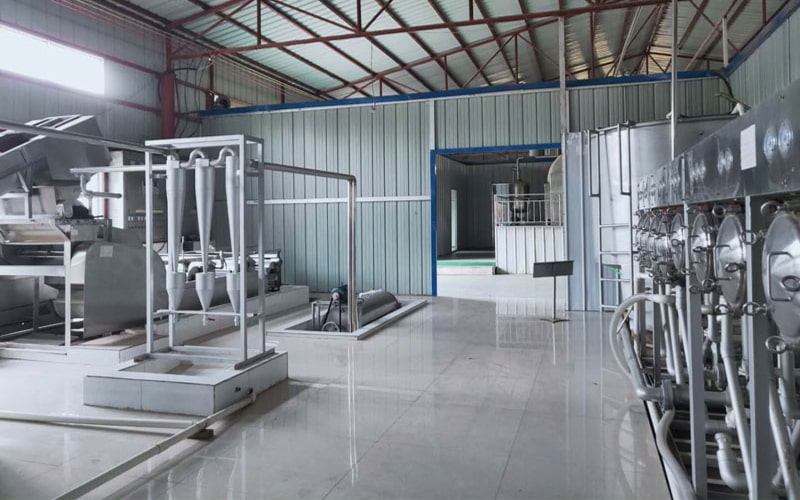Setting up a cassava starch factory in Ghana is a viable business venture for numerous reasons. There is a huge demand for starch for industries in China and other parts of the world. Ghana has vast land to produce cassava, which can also be cultivated in most parts of the country.
Furthermore, there are multitudes of farmers with vast experience in cultivating the tuber all year round. Yet the existing starch factories in Ghana are few and far between. A considerable number of Ghanaian businessmen and investors have discovered the wealth in cassava processing and are moving on to establish factories. By the end of 2021, a minimum of 6 six starch factories will be commissioned all around the country. If you are considering owning a starch factory, you must make adequate preparations to make it a cash cow. This article will outline five important factors to consider when setting up a starch factory in Ghana.
(A) - Get a Business Plan
As Benjamin Franklin supposedly once said, “If you fail to plan, you are planning to fail.” Owning a factory requires adequate planning for many areas including raw material, electricity, water, labour, working capital etcetera. Thus, it is fundamentally important to spell out your financial plan, define your goals and strategies etc. This plan will not only serve as a roadmap to success, but also as a tool to convince your investors or partners about the viability of the project.
(B) - Off Takers are Necessary
After producing your starch, what’s next? Although there is a huge demand for cassava starch, there has to be a bridge from your factory to the end user. It is therefore prudent to partner with off takers to guarantee the sale of your products. You need to have answers to the Who, What and Why questions before you start producing. Who will you be selling your starch to? Knowing your market is important because different countries require different grades of starch, and you must be sure that your factory will produce to meet the standard of your market. The next question is what price will you be selling at? Your selling price is important because it will determine your profits and also help you make income projections. The current selling price is about USD485 per ton according to the Thai Tapioca Starch Association prices. The third question is when will the off take be done and at what intervals? You need to confirm how often your off takers will pick the starch, because you definitely do not want to store too much starch in your warehouse waiting to be sold. Hence, it is important that you have a concise off taker agreement as a form of guarantee for returns on your investment.
(C) - Don't Compromise on Factory
We all love to pay less and cut down cost. However, you should never settle for the cheapest alternative when it comes to setting up your starch factory. As you may already know, cassava contains cyanide, which causes machines to deteriorate very quickly. It is essential that your machines are made with quality materials which can withstand the cyanide reaction and last for a long time. Quality materials cost more, and it is definitely better to make a bigger investment which will last longer, than to choose the cheapest alternative which will become a pain in the neck and to be replaced in no time.
(D) - Maintenance is Key
Cassava processing factories can run for up to 24 hours with few hours of rest. Your factory will therefore need routine maintenance and servicing to promote the life span of the equipment. Like any other machine, there will be daily wear and tear which would require replacement and good maintenance services. Thus, you need to plan ahead for the supply of spare parts and daily consumables of the processing line. It is better to import and stock spare parts and consumables at your factory site, so you do not wait for months to import parts when needed and stall production.
(E) - Make Adequate Preparation for Raw materials
Finally, when you have your factory, you will discover that the key to unlock the wealth in your investment is in the ground. More than ever, you would come to value the same cassava that your friends only consider for fufu. You surely do not want to invest a fortune only to have an idle factory, thus you must make preparations ahead of production for timely supply of fresh cassava to your factory site, even before commissioning (since you need cassava for the test run of your factory.) When it comes to the cassava variety, you need to consider recommendations from experts. In Ghana, you can choose to use any of the modified varieties such as Capevars Bankye, Bankye Botan, Sikabankye among many other varieties containing high starch content. Furthermore, you need to prepare a supply schedule including the cassava that will come from your own farms, your out growers or both. I recommend that the planting be done in shifts, so that only the daily required quantity is supplied. You must not store up too much cassava, as this will compromise the quality of the starch if it stays too long.
Conclusion
In a nutshell, setting up a cassava starch processing factory in Ghana is a good channel to generate millions of dollars annually, owing to the huge market demand in China and other parts of the world, and the advantages Ghana possesses to produce and process cassava. However, before successfully establishing a starch factory in Ghana, adequate preparations must be made to ensure a successful project. It is expedient that you prepare a comprehensive business plan, secure a concise off taker agreement, choose high quality equipment, arrange for maintenance and spare parts supply and make adequate preparations for the daily supply of fresh cassava. Apart from creating a sea of wealth, owning a starch factory will create jobs for many Ghanaians, promote Made in Ghana Starch on the international market as well as promote industrialization in the country. I would end by commending TIAST Group for giving the opportunity to everyone within Ghana and West Africa to become owners of Starch processing factories and to provide financial support, technical support and a ready market for the export of starch to China.
Irene K.A. Sackey

Business Development Manager
0509568081
irene@tiastgroup.com


Comments are closed.